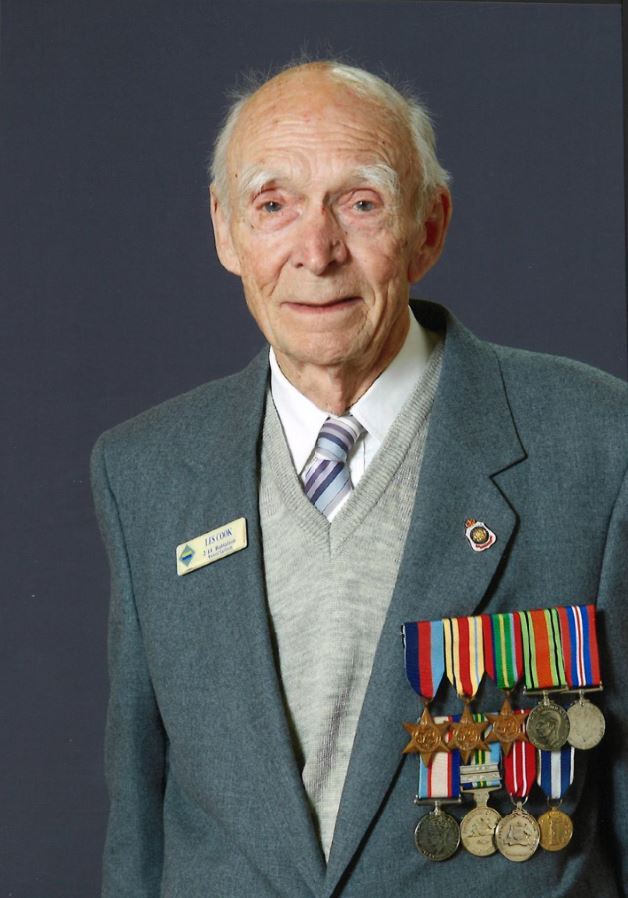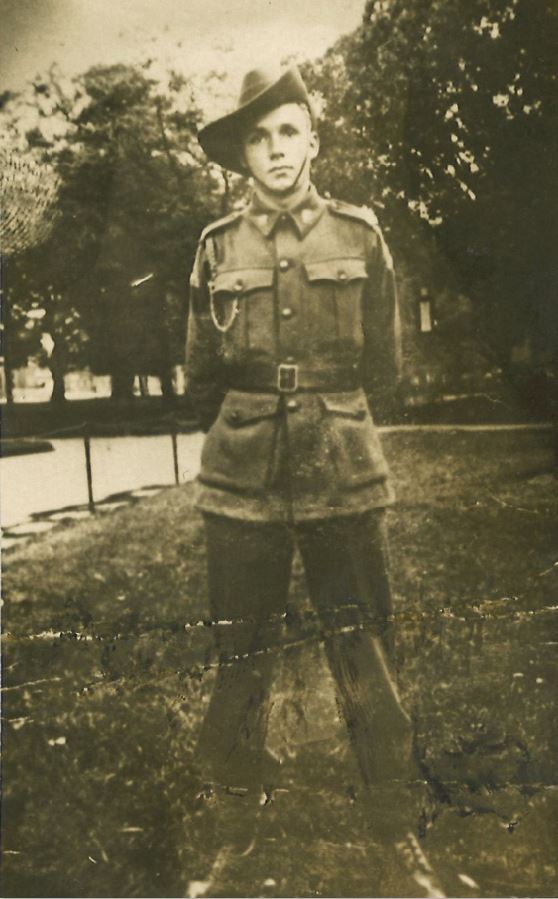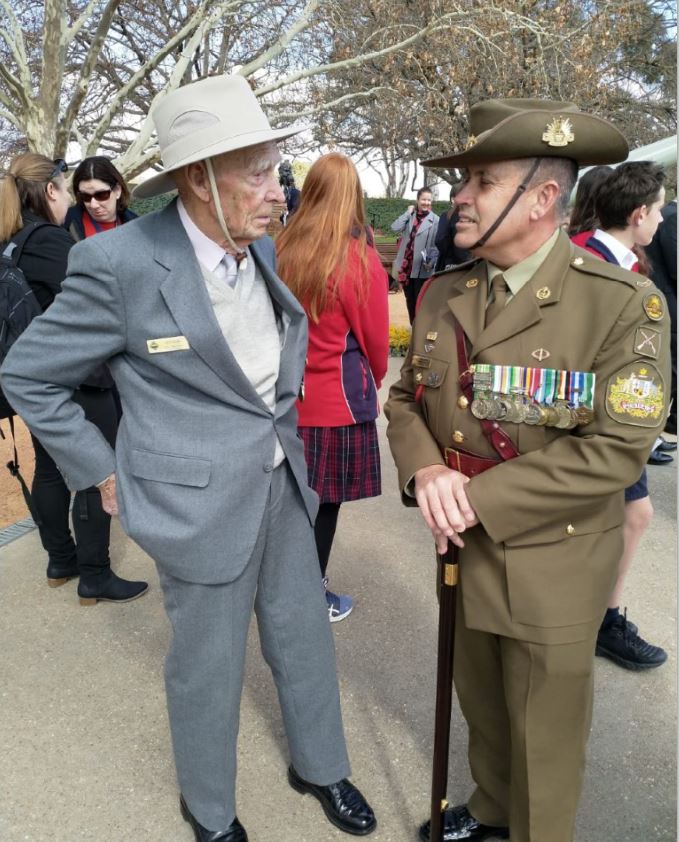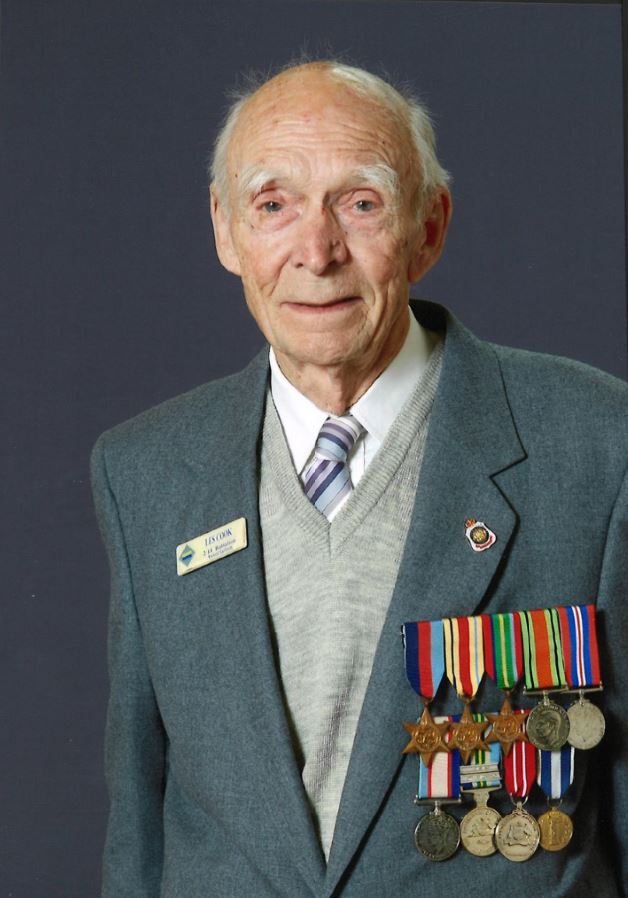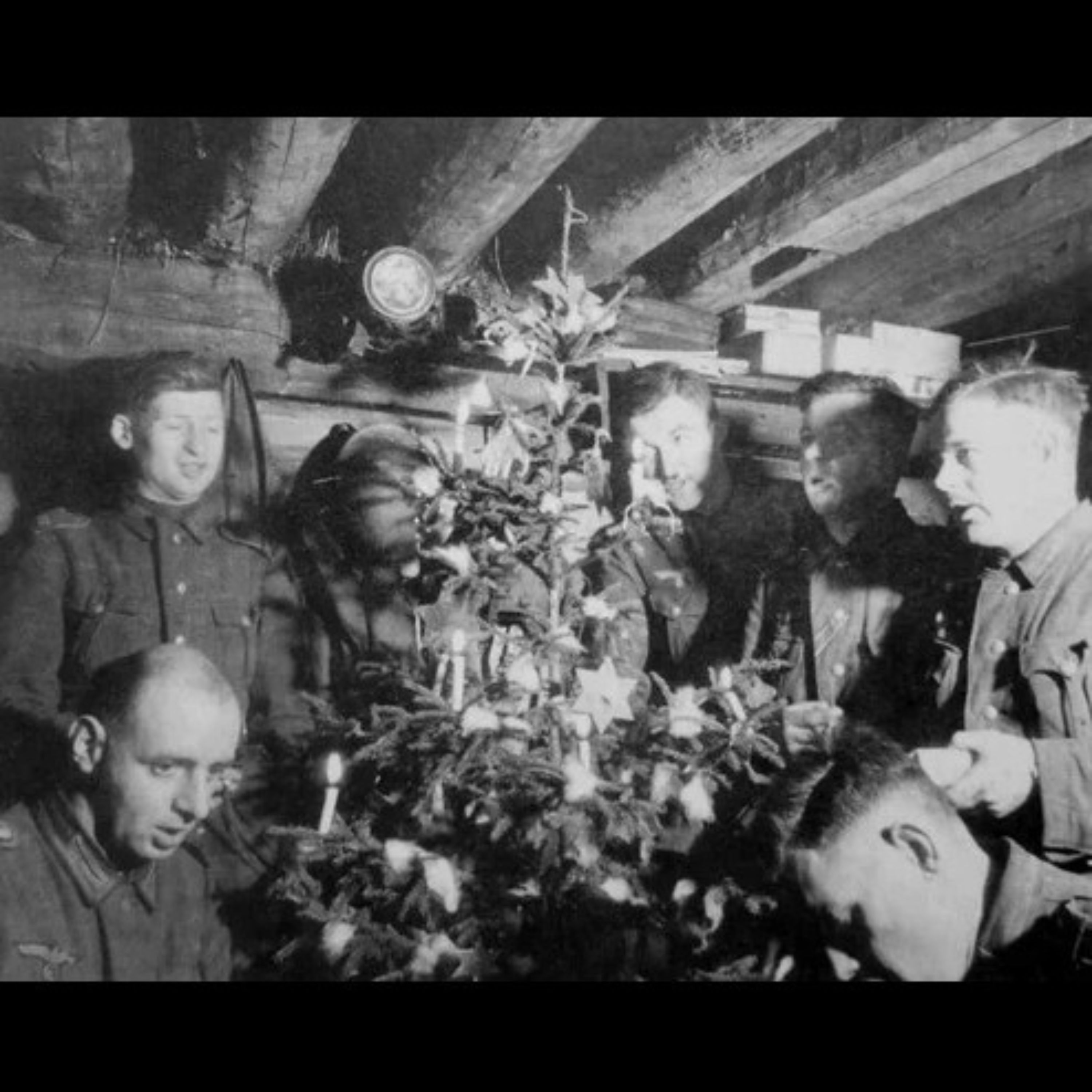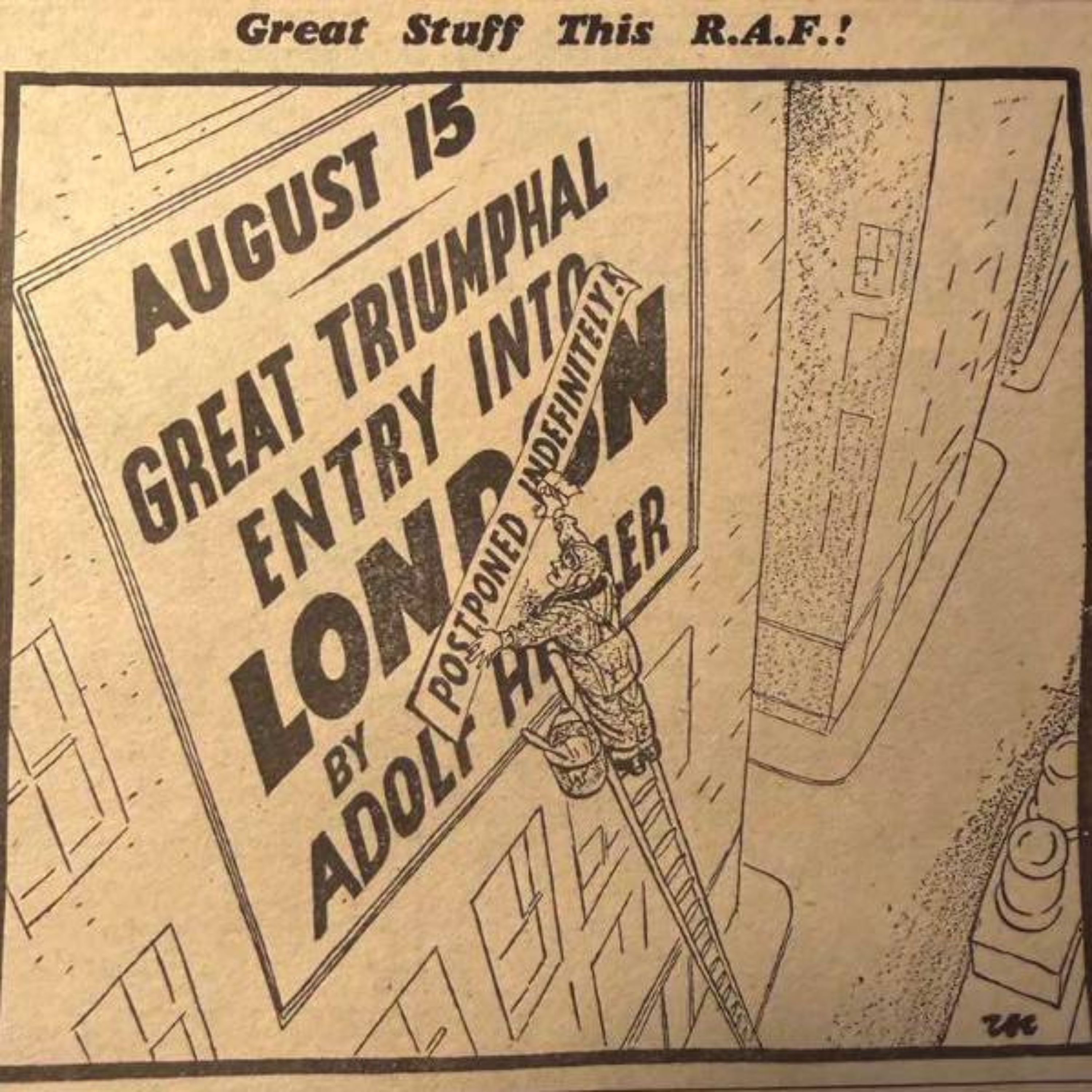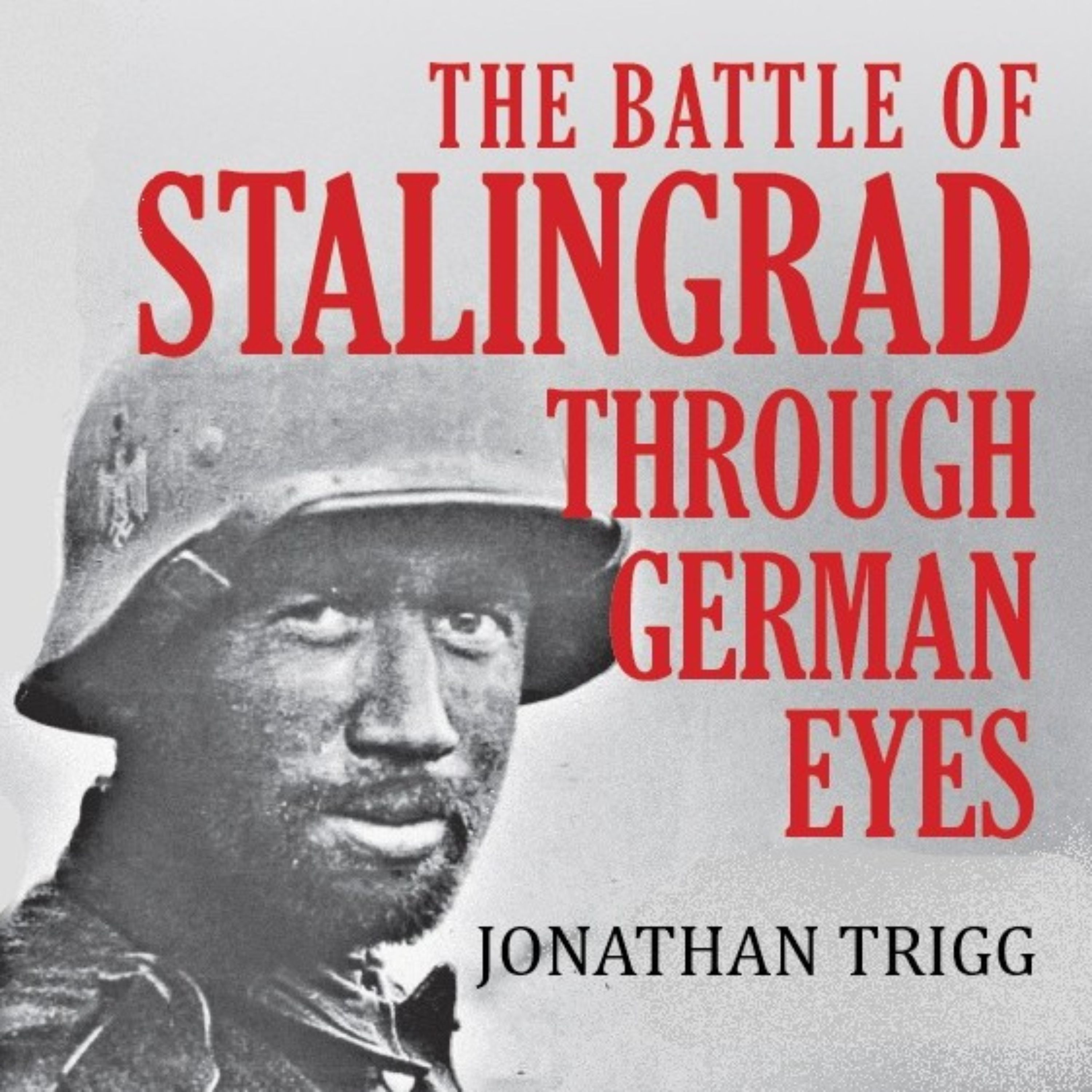81 Coffee with Cpl Les Cook Part 1

Australian Corporal Les Cook, WW2 Kokoda trail, New Guinea
A long chat with Australian veteran Leslie Cook, his views on the Pacific war and more tales of his WW2 adventures.
Various family stories and an opportunity to donate to one of the several charities supporting the refugees.
Donate To Salvation Army Ukraine Crisis Appeal
https://bit.ly/FightingThroughSalvationArmy
Red Cross/ Disasters Emergency Committee
https://bit.ly/FightingThroughRedCross
British Normandy Memorial and Harry Billinge
https://www.britishnormandymemorial.org/
Reviews on main website
https://www.fightingthroughpodcast.co.uk/reviews/new/
Apple reviews - https://itunes.apple.com/gb/podcast/ww2-fighting-through-from-dunkirk-to-hamburg-war-diary/id624581457?mt=2
Follow me on Twitter - https://twitter.com/PaulCheall
Follow me on Facebook - https://www.facebook.com/FightingThroughPodcast
Interested in Bill Cheall's book? Link here for more information.
Fighting Through from Dunkirk to Hamburg, hardback, paperback and Kindle etc.
Les Cook Australian veteran of Burma, New Guinea, Kokoda trail, WWII podcast
Les Cook Anzac Day 2018
Fighting Through WW2 Episode 81 – Coffee with Les Cook 1
More great unpublished history! WWII
This is indeed the Fighting Through Podcast Episode 81 Coffee with Les Cook - ww2 memoirs
Welcome
Hello again and another exciting/warm WW2 welcome to the Fighting Through second world war podcast.
I’m Paul Cheall, son of Bill Cheall whose WWII memoirs have been published by Pen and Sword – in FTFDTH.
The aim of this podcast is to give you stories behind the story. You’ll hear memoirs, and interviews with veterans in all the countries and all the forces. I dare you to listen!
This episode
Today we’ve got my interview with Australian Les Cook whose epic stories you heard in ep 63-68 and I’m talking with Les about those stories and more.
We’ve got Les zooming on his computer with the support of his daughter Deb and her husband Tony who feature occasionally in the background. So we were chatting on Zoom all the way across the world - how good is that?
And of course what could be better than this episode going out around ANZAC day. Les has numerous observations about the war which you probably don't get in the history books. And it's just great to hear him retell some of the stories you've already heard, usually with a different slant. This was a very long coffee with Les, so much so that I think we were all on the ceiling by the end of it and I've extended it into two separate episodes with the second part coming within the next day or two.
I've got quite a bit of feedback and family stories to share with you first and I can assure you that Les will be well worth the wait!
A bit of sad news to share with you before we start.
Harry RIP
D-Day veteran Harry Billinge has died aged 96 after a short illness. Harry was a sapper in 44 Royal Engineer Commandos, surviving the storming of Gold Beach on June 6th 1944, Caen and the Falaise Pocket.
Harry worked tirelessly supporting veterans causes, spending more than 60 years collecting for the Royal British Legion 's Poppy Appeal and helping to raise funds for a national memorial to the 22,442 men and women under British command who fell in Normandy. His many efforts were recognised in 2020 when he received the MBE from Her Majesty Queen Elizabeth II.
Harry never considered himself a hero, just lucky. In his view the heroes were his fallen comrades and should not be forgotten.
The British Normandy Memorial now stands as a fitting tribute thanks to the dedication of Harry and the many fundraisers who made it happen and cared for by CWGC.
Feedback 1 Bus Bos - ww2 history
Whose grandmother in the last episode gave the finger to a German soldier.
Hi Paul!
Thank you for the way you told my grandmother's story. My mother shed a tear when I made her listen to it, and I think that's the biggest compliment you can get for just those 5 sentences. My mother told me she felt very proud of her mother.
Unfortunately my grandmother passed away a couple of years ago but I'm sure she would have been very proud if she knew her experiences were used for the purpose of helping people in Ukraine. My mother says she at least wants to type out the whole diary in Dutch, so that's a nice start!
I hope her story helped :)
Bus Thank you so much for that bit of feedback. To respond to your hopes, the the Ukrainian appeal did get a good response from listeners and I'm keeping the links to the Salvation Army and red cross appeals open in the show notes indefinitely. You might like to know that I've recorded over 50 click-throughs to the links and counting, so that's possibly £10 a pop for each click through making £500 collected for the appeal, maybe even double that but I'm not party to this process so I don't know. So thanks to those listeners who generously supported this.
I've had several decent bits of feedback about the Ukraine episode from the following people:
Feedback 2 – Bernie
I as you would say "was Chuffed to hear the story I had sent you read out”. Well done.
I just finished listening to your episode about the Ukraine. I was interrupted by a customer half way through who was telling how worried her daughter is who is living in Northern Norway at the moment. She is planning to move to Greenland soon and they are worried as Russian troops are massed near the border with Norway getting ready for an invasion and most likely they will be taking Greenland as they have been talking about it for years.
Lots of oil and minerals there for the taking. The world needs to be warned about this.
I meant to mention that it is great that so many countries have pitched in against Russia.
Australia has sent a lot and the USA is really pitching in too. I love the story I saw on the news about the fire trucks going to Ukraine in Convoy! I hope the Ruskies don’t hit them as they are going in as a humanitarian mission.
Family stories 1 Jay S ww2 podcast
Hello Paul, thank you for finding a passion that makes our live that much richer. I appreciate Your encouragement to support the Salvation Army. My own continued support for that noble charity stems from an incident experienced in the early 90’s.. A small town sheriff was tragically killed by a man and woman duo of would be bank robbers. This occurred in a small Mountian town high in the southern Colorado Rockies during the winter. I was a wildlife officer and had worked with the sheriff, so responded to assist in the manhunt for the perpetrators. The November weather was snow covered and bone chilling in the rugged Mountian community. We worked in teams throughout day clearing remote cabins in search of the armed suspects. In the end we discovered they had taken their own lives when faced with inevitable capture. We were worn plumb out and half numb from the cold when a Salvation Army food truck was waiting for us with hot coffee and food. The volunteer had driven through the night to provide help.
I have always donated and even became a Christmas bell ringer to support the Salvation Army. This organization stands high in my regard for being a truly charitable army. Undoubtedly your listeners contributions will reach those Ukrainians in dire need of assistance.
Your efforts make a difference on many fronts, thanks Paul.
Jay Sarason
Review 1 – Jack Fritz
Several people kindly left show reviews in various places:
Hi I am 13 almost 14 as of the 20th of apirl (2022) I had a granpa on my dads side served in the pacific during ww2 on a repair ship - he never saw action and he returned and i belive he died before i was born - or maybe I was just to young to remember him
by Jack Fritz USA – FTP web site
Review 2 Dorian
My Favourite World War Podcast
This is a unique podcast and very detailed. Paul’s lakonic delivery feels like someone chatting with you in a bar. But imagine that bar is in Dunkirk in 1940 or Normandy in 1944. This is a special podcast for fans of 20th century history.
Dr Dorian T from Australia
Oh thanks you Dorian – such nice words and I’ve put part of your review in my entry to the British podcast awards which are currently underway – I’ll let you know if I win anything.
And as you’re an Aussie, maybe from Cinbra, I’ll dedicate this episode to you.
Review
Buy me a coffee 1 Tristan
My grandad on my moms side was on the submarines during WW2 & sadly was killed in action off Malta
they didn’t call them iron coffins for nothing !
Tristan Smith
Thanks for the coffee!
Buy me a coffee 2 Gary Heavens
Calvados
Buy me a coffee 3 Garry Rose
Calvados
These stories have inspired me to find out my uncle's stories. Keep up the excellent work.
Thank you guys, all of you
Survey Comments – Jamie Buhr
Many thanks for a very generous Coffee!
The DDay episodes! I was born in 1948 and since age 10, as I learned about WW2, I continued to be amazed that the young fathers/men around me had been asked to go away for years to save the World...and they did. Yet, they could come back and, generally, lead normal, mostly productive/happy lives.
DDay and the march to Berlin are the best examples of the difficulty of the mission and the related sacrifices. I also continue to marvel that by 1958 (age 10 for me) that the Germans and the Japanese had become our allies after having started a War that cost the World 70 million people, plus wounded and psychological casualties!!!!!!!
Jamie Buhr
USA
War stuff 1
To get on the good side of voters, Vladimir Putin goes to visit a school in Moscow to have a chat with the local children. He talks to them about how Russia is a powerful nation and how he wants the best for the people. At the end of the talk there is a Question and Answer session. Little Sasha puts up her hand and says ''I have 2 questions. "Why did Russia invade the Crimea and why are we amassing troops at the the Ukraine border?" Putin says '' Very good questions '' but just then the bell goes for lunch break. When they come back to finish the Q&A section another girl, Misha, puts up her hand and says ''I have 4 questions for you. Why did Russia invade the Crimea and why are we amassing troops at the the Ukraine border? Why did the lunch bell ring 20 minutes early and where the hell is Sasha?"
Just picked up this breaking news:
A large group of Russian invaders on the outskirts of Kyiv are moving along the road, when suddenly from behind a small hill they hear a voice shout: "One Ukrainian soldier is better than 10 Russians!" Yes I think you’re with me …
The Russian commander orders a halt and his 10 best soldiers to go over the hill; a fire fight begins, it lasts for a few minutes and stops.
Again a voice: "One Ukrainian soldier is better than 100 Russians!" The Russian commander then sends 100 of his best soldiers. Shooting again, screams, 10 minutes later silence.
The quiet Ukrainian shouts again: "One Ukrainian is better than 1,000 Russian soldiers!" The Russian commander sends 1,000 of his fighters over the hill.
The sounds of fighting, grenades, shots are heard. More screams - Silence.
Suddenly, one seriously wounded Russian soldier crawls over the hill and the dying man begs his commander:
"Don't send anyone over there. It's a trap. There are two of them ..." 😉 🇺🇦
Bum Bum
War stuff 2 New Books
A true bit of war stuff now - lest you be in any doubt, I would like to confirm that two books are definite for publication through Pen & Sword later this year and both have featured on the podcast so I’m delighted to confirm that Heidi Langbein-Allen will be seeing The Last Bullet on the bookshelves, about her German boy soldier father.
And Mike Moss from Canada will be joining her with the memoir from his father, Brian Moss of the Royal engineers who has featured several times in this show under the guise of the Blitz, Wadi Akarit and D-Day. Title tba!
Oof my word on two counts.
Both books are due out around October 2022 so keep a space in your diary and your Christmas list! I’ll keep you updated.
Main event
Leslie Eric Cook was in the second 14th. And he served in Greece, Crete, Kokoda (the New Guinea Owen Stanley campaign), Borneo and in the occupation forces in Japan.
He has written many stories of his war experiences, mostly on the lighter side. You’ve heard most of his stories in a series of episodes 64 onwards.
I interviewed him last year and I’m delighted to finally bring you the edited recording, interspersed with a few more of Les’s stories.
End
And there we will leave Les at least as far as the interview is concerned but we have got quite a few post script stories coming up, and not the least with an out take that you do not want to miss.
Thanks
Round up
Listener thank you so very much for your support and for making the time to listen to me.
And please share the show with other people whenever you can. Above all – enjoy. Please do hear me next time.
Next episode
Next episode we'll hear more from this Les Cook interview and I'm pretty sure I've got one more Untold Story from him that I'll be reading out myself for quite a poignant finale.
PS
We've had some great fun in the past with various veterans introducing the show, learning their Lines in a very sporting fashion. Of course, when we laugh, we are laughing with them not at them. On this occasion, with Les, his hearing let him down, as is so often the case with these veterans, but he was very happy to share this edit - otherwise destined for the cutting room floor.
Over to Les again.
I’ll add that no veterans were harmed in the making of the intro to this show and I’m using it with the full blessing of Les and family. Les – thanks for being such a good sport.
Tanks For The Memory.
There must have been a great number of imaginative inventions submitted to the authorities during the war, but, if any were accepted and put into use, we didn’t see many of them. With few exceptions, we ended the war with the same equipment and weapons with which we had started. Most of our weapons were of a type used in the first war twenty years before, and we were probably the only army in the world which still used rimmed cartridges in our rifles and machine guns. Apparently we were resistant to change.
I was fortunate enough on one occasion, however, to observe the demonstration of one invention which I believed then and still believe had great potential. Needless to say, I never heard of it again!
The device was a small remote-controlled tracked-vehicle about one and a half metres long by about 60 cm wide and about half a metre high. In shape, it looked like a miniature tank and worked on the same principles. The vehicle was controlled by a hand-held panel which transmitted signals along wires unwinding from a drum on the vehicle as it moved. It was powered by electric motors, carried its own batteries, and was capable of a top speed of about 50 km per hour, depending, of course, on the terrain According to the inventor, the prototype had a carrying capacity of about 25 kg, but this could easily be increased.
The inventor was a mechanical engineer who had designed and constructed the vehicle himself. He had been with an engineering field-company during the first war, where part of his work had involved him going out into no-mans-land after dark to cut gaps in the enemy’s defensive barbed-wire entanglements. Lying out there in the mud, under fire, with a pair of wire-cutters cutting the wire by hand was a slow and dangerous business, and he had determined that if he got back he would find a better and safer way of doing it.
This vehicle was his answer. It could carry 25 kg of explosives out to the enemy wire in daylight where it could then be detonated, thus blowing a gap in the wire. Because of its low profile and relatively high speed it would have a good chance of surviving the one-way journey. The operator could control the vehicle in relative safety by observing its movements through a periscope. He had estimated that the cost of mass-producing the vehicle would be in the order of 50 pounds ($100). This moderate cost was less than the cost of equipping one man.
In addition to his original concept of destroying barbed-wire entanglements, he pointed out that the vehicle would have many other uses. It could be used to take a signal wire or ammunition or food to an outpost that was otherwise cut-off by enemy fire in daylight. Loaded with explosives, it could also be used against tanks. In the role of tank-destroyer, it had the advantage again of its low profile, speed, and manoeverability. If the tank avoided its first pass, the vehicle could be turned around very quickly and brought up under the rear of the tank and exploded there. At that time, the speed of the vehicle was equal to or exceeded the speed of most tanks used in direct support of infantry.
The inventor demonstrated this vehicle to a large number of senior officers from both the Australian and American armies on a sports ground at Toowoomba in Queensland. Standing under cover and looking through a periscope he drove the vehicle up the steps of the pavillion, into the building, turned it around, and brought it back down the steps. I suppose that it would be considered old-hat by comparison with today’s radio-controlled vehicles, but it was an innovative concept for the time.
At his invitation, many of the officers tried their hand at controlling the vehicle in the open. This was the cause of great hilarity, and a good time was had by all. Unfortunately, in my opinion, nobody seemed to take the thing seriously. One could tell from his appearance that the inventor was bitterly disappointed by the frivolous attitude of our officers. The Americans did at least appear to take some technical interest in it.
As groups of our officers walked away after the demonstration, I heard one say to another “Its not practical-it would be too vulnerable to small-arms fire”, to which the other, who obviously had a better understanding of war, replied “Not nearly as vulnerable as a man”
I thought of this vehicle and spoke of it often a few months later when we were at Gona, where the Japanese bunkers were so well-camouflaged and heavily constructed as to be almost indestructable either by bombing or artillary fire. Repeated frontal attacks by infantry against these bunkers had proven to be ineffective and horribly costly. I realize that it would have been very difficult, if not impossible, to get these remote-controlled vehicles over the muddy track that led from the airstrip at Popondetta to Gona, but if it had been possible they would have been instrumental in saving many Australian lives. The battle area was small, the lines were close together, and it would have been possible in several key places to have driven the vehicle up to the bunker and exploded it there.
As far as I am aware no other country produced a similar vehicle. It was uniquely Australian, and had the prospects of being a very useful and versatile weapon. Why didn’t it get past the prototype stage?
But I feel sure we’ve covered a story about such an invention in a previous episode being used during the Normandy campaign by the Allies – but I can’t find reference to it.
Listener – answers in an email on any of the above.
PPS Punishment By Remote WW2
The transit camp at Oonoomba near Townsville was the only camp I was in where the ring-keeper at the Swy game scooped up a handful of fine red dust with the pennies and had to let the dust filter through his fingers before the coins appeared so that he could call them. The dust was so deep that some of the coins must actually have been standing on their edge when his fingers found them.
Apart from the warm beer served in enamel mugs, Oonoomba was also famous for its unusual defaulters parade. There was a high hill near the camp on which, if memory serves me correctly, there was very little vegetation. It had been a camp custom, initiated no doubt by the camp RSM, to use this hill to inflict the last punishment of the day on defaulters.
At Tattoo, each defaulter was given a hurricane lamp, which he had to carry to the top of the hill then return to camp. As it was dark, the Sergeant Major or the Orderly NCO could observe progress by watching through the window and thus ensure that the full course was covered.
Apparently this worked very well until two enterprising defaulters left their lamps on the top of the hill and kept going - presumably to jump the rattler and go south for a bit of unofficial leave.
I’m Paul Cheall










